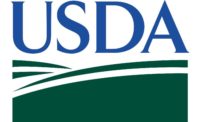The U.S. Department of Agriculture is announcing partnerships for a new, interagency pilot project aimed at offering more localized ground bison meat for tribal communities through the Food Distribution Program on Indian Reservations (FDPIR). The pilot will look at changes to how USDA purchases bison to better support buying the meat from local, small and mid-sized bison herd managers and delivering it directly to their local tribal communities. This announcement was made by USDA Under Secretary for Marketing and Regulatory Programs Jenny Lester Moffitt, Food Safety and Inspection Service Administrator Paul Kiecker, USDA Office of Tribal Relations Director Heather Dawn Thompson, and a regional representative from USDA Food and Nutrition Service, who met with principals from the three tribal nations participating in the pilot, the Cheyenne River Sioux Tribe, Standing Rock Sioux Tribe and Lower Brule Sioux Tribe, their herd managers and local producer Dakota Pure Bison.
These local purchases will reduce the time and distance the meat travels to the consumer, increase economic development market opportunities for tribal and local bison operations and provide high-quality, nutritious foods for nutrition assistance programs.
USDA’s Agricultural Marketing Service, which coordinates food purchases on behalf of USDA, the Food and Nutrition Service, which administers FDPIR, the Food Safety and Inspection Service and the USDA Office of Tribal Relations are working together to bring this new opportunity to tribal communities.
“USDA recognizes the role its purchasing power can play in providing access for smaller, local, and tribal producers,” said Agriculture Secretary Tom Vilsack. “We’re pleased to take this step forward toward offering locally raised bison directly to the tribal communities where those herds are located.”
Tribal communities have long shared an interest in accessing more localized food products through FDPIR. Tribal leaders indicated that USDA purchase specifications do not align with how tribal and other small and mid-sized producers operate. This pilot responds to feedback from across Indian Country and from small producers by aligning purchase timeframes with indigenous informed principles of infrequent animal handling, traditional field harvests following a nature-based purchasing calendar, and allowing either USDA or state inspection. This pilot will also explore smaller packaging and purchase orders to meet small and mid-sized enterprises at scale and exclusively target Historically Underutilized Business Zones (HUBZone) purchase preferences, benefiting economically distressed areas, of which all tribal reservations qualify. All producers announced through this pilot operate on tribal lands.
“Our nation-to-nation relationship with tribes enriches how USDA does business for Indian Country and for all of rural America,” said Director of Tribal Relations Heather Dawn Thompson. “This pilot is an important step to use government procurement flexibly for the benefit of tribal and our smaller producers and their surrounding communities.”
USDA’s pilot project is a significant step forward, creating better market access, and increasing incorporation of foods important to indigenous communities. By offering more access to local and tribal bison meat for tribal communities, USDA is investing in a more open food system for all.
The Agricultural Marketing Service recently awarded bison contracts to four tribal and local producers on Sept. 18 to test the flexibilities outlined above. Contracts were awarded to:
- Akicita Consulting, owned by the Lower Brule Sioux Tribe.
- Brownotter Buffalo Ranch, operating on the Standing Rock Sioux Reservation.
- Cheyenne River Sioux Tribe Buffalo Authority Corp., owned by the Cheyenne River Sioux Reservation.
- Dakota Pure Bison, operating on the Rosebud Sioux Reservation.
The Food Distribution Program on Indian Reservations is administered by the USDA Food and Nutrition Service and provides nutritious domestic USDA Foods purchased by the Agricultural Marketing Service, along with administrative funding, to participating tribes and state agencies. These foods are then distributed to FDPIR participants, which include income-eligible households on Indian reservations or Native American households residing in designated areas near reservations or in Oklahoma, to help fight food and nutrition insecurity.
Source: USDA



Report Abusive Comment